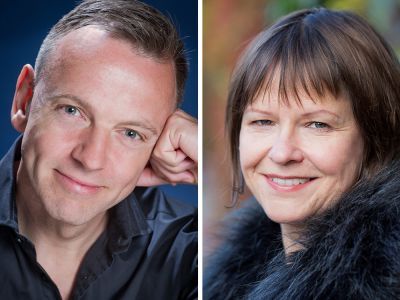title

Could you tell us a little about Haydn’s La Fedeltà Premiata?
SB – Composed in 1781 to celebrate the opening of a new theatre at the Esterhazy Palace in Hungary, La Fedeltà Premiata is part farce, part love story. Set in mythological Arcadia it follows three dysfunctional couples attempting to dodge both a hungry sea monster and an irate Goddess!
This particular opera is rarely performed – why do you think this is?
SB – La Fedeltà Premiata was very much an instant hit and had subsequent productions soon after in Germany. Yes it’s a rarity but not neglected or forgotten, and for good reason.
It’s unfortunate for Haydn that his style of dramma giocoso was quickly upstaged by Mozart who took the form, especially with Da Ponte, to a much more penetrating, psychological level. But Haydn started what Mozart finished.
What do you particularly like about this opera?
AF – There are some stunning arias and ensembles. The orchestral writing, particularly for the strings, is superb. The opera has a wonderful (though at times confusing) balance of the comic and serious.
SB – Haydn is perhaps best known for his string quartets and of course his symphonies of which one of the most famous and popular is Symphony No. 94, the ‘Surprise’. And La Fedeltà Premiata contains a delicious surprise in that it is obvious from the start that we are in the land of comedy, of opera buffa, but then at just over halfway, with very little warning, we go through the metaphorical wardrobe door into new territory – a very serious, melancholic ‘Narnia’ where we are faced with music laced with the very real pain of unrequited or misplaced love. I really admire how Haydn deftly weaves a silken thread of melodic beauty through a crazy tapestry of buffo shenanigans and skillfully wraps up each Act with sophisticated, zany Finales that look ahead to the Finales of both Mozart and even further to the showpiece Finales of Rossini’s comic operas.
How have you both approached this production, what ideas/inspirations did you have in mind?
SB – It took me a little while to establish ‘traction’ with the piece. But then I realised our characters were caught Pirandello-like in the tentacles of a late 18th-century opera of the absurd which proudly resists the application of logic or conventional theatrical naturalism. That fired my imagination and freed me to explore the piece in a less conventional way.
What’s the process been like so far?
AF – Enormously rewarding; intense but fun.
SB – Joyous! I have worked with conductor Alice Farnham, the Guildhall soloists and some of the technical students before on separate productions, so the first day of rehearsals was a happy reunion of kindred spirits rather than the usual ‘best behaviour’ formality of a Meet & Greet. This allowed us to get stuck right in to the material with no self-consciousness and we have been making many wonderful discoveries and laughing with, and at, each other so much! It’s great when you experience this absolute synchronicity in a rehearsal process.
What are you most enjoying about working on the production with Guildhall singers, musicians and production artists?
AF – The singers arrived on day one incredibly well-prepared and had clearly thought a great deal about their roles, both musically and dramatically. They are also open-minded and happy to delve deeper into the music and drama. There’s a wonderful atmosphere of collaboration, and I have an excellent music staff, made up of students and fellows. The have a very positive attitude and keenness to understand the difficulties as well the satisfaction of playing in a pit. An opera orchestra is part of something bigger, but nonetheless the driving force behind the drama.
SB – Unquestionably the very high standard of both vocal and Production Arts students – perhaps the finest in the country – which in turn reflects the amazing quality of the teaching at Guildhall. I feel genuinely privileged to work with the industry professionals of tomorrow in such a well-resourced and nurturing environment, and also a huge responsibility to live up to the trust that both the School and the students are placing in me.
Who have been some of your biggest inspirations in your careers?
AF – Probably the most important inspiration has been my conducting teacher is Ilya Musin in St. Petersburg. He was actually older than Shostakovich and I was lucky enough to benefit from his extraordinary teaching and artistry at the very end of his life, in his mid-90s. His voice, his influence, his sheer musical force is still somewhere at the back of my mind whenever I perform.
What would be your top tip for young conductors/opera singers?
SB – Don’t just learn your vocal part – LISTEN to the music. All the clues and all the answers to your dramatic as well as your musical needs lie within it.
AF – We often talk about playing to your strengths, your U.S.P, but actually there is so much talent out there. I believe it’s really worth working on your weaknesses just as much. That way you are likely to have ‘the whole package’. While you’re studying this is the time to do it.
Very occasionally you may work with colleagues whose behaviour you find challenging. Always try to find the best in them, and try to bring out the best in them. The music world is so small, and people talk.
Finally, never stop learning. We are music students all our lives.
Haydn’s La Fedeltà Premiata will be performed on Monday 4, Wednesday 6, Friday 8 and Monday 11 November 2019 in Silk Street Theatre at 7pm. Book your tickets now.